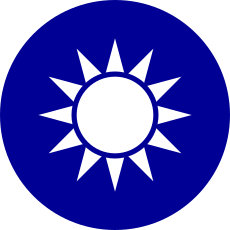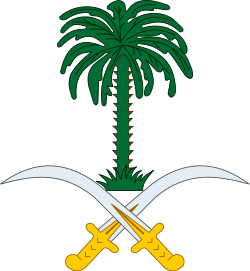Taiwan–Saudi Arabia relations
Taiwan |
Saudi Arabia |
|---|
After World War II, the Republic of China (Taiwan) maintained diplomatic relations with only a few Middle Eastern countries, one of which was Saudi Arabia.
The Hui Muslim General Ma Bufang was appointed as the first Republic of China ambassador to Saudi Arabia. This was for two reasons. The first reason was largely out of economic necessity, as Saudi Arabia was the largest supplier of oil to Taiwan, with Taiwan's state-run Chinese Petroleum Company, importing about 40% of its oil annually from Saudi Arabia.[1]
As Taiwan was so reliant on Saudi Arabia's oil supplies, Taiwan put a significant amount of effort into maintaining relations. The second reason for the friendliness of Taiwan's Nationalist government towards Saudi Arabia was because since 1949, Saudi Arabia was one of the most influential countries to recognize Taiwan as the Republic of China, even after it lost its seat on the UN Security Council in 1971. Citing respect for Islamic religion was another. [2]
Relations between Taiwan and Saudi Arabia began around 1965 and were initially based on an agricultural relationship. As a way to demonstrate rice cultivation, Taiwan sent agricultural missions to Saudi Arabia. Then, in 1973, the two countries signed an agricultural cooperation agreement, in which Taiwan provided Saudi Arabia with a number of assistance programs, including irrigation, mechanized cultivation, soil, meteorology, crop rotation, and fishing technology. In 1978, Taiwan also began providing technical assistance in the field of health care. Taiwan has even provided Saudi Arabia with a number of doctors and nurses.[1]
Taiwan also provided significant technical assistance to Saudi Arabia. In 1973, Taiwan's largest heavy construction company, Ret-Ser Engineering Agency (RSEA), began working on the 110-kilometer Mecca to Hawiya highway in Saudi Arabia.[3] This led to other large projects like the Shaar highway.[4] Other projects included the construction of an industrial park and sewage system, offshore and onshore work in the Saudi Naval Expansion Program, and housing for the King Abd al-Aziz Military Academy and King Khalid Military City. As of 1984, RSEA's projects in Taiwan amounted to a total dollar value of $1.3 billion. The majority of trade between the two nations consisted of petroleum from Saudi Arabia and building materials and consumer goods from Taiwan.[5]
Saudi Arabia ended its recognition of Taiwan in July 1990, when it established official diplomatic relations with the People's Republic of China.[6] It is now represented in Taipei by an unofficial mission known as the Saudi Arabian Trade Office in Taipei.[7] Similarly, Taiwan maintains a Taipei Economic and Cultural Representative Office in the Kingdom of Saudi Arabia in Riyadh.[8]
See also
References
- 1 2 The Saudi Connection Far Eastern Economic Review, 9 July 1982, pp. 28-29
- ↑ Wang, T.Y. "Competing For Friendship: The Two Chinas And Saudi Arabia." Arab Studies Quarterly 15.3 (1993): 63. Academic Search Premier. Web. 14 Apr. 2012.
- ↑ ROC contractors get many overseas jobs, Taiwan Journal, August 28, 1977
- ↑ A Signal Human Victory, Taiwan Info, August 1, 1986
- ↑ Wang, T.Y. "Competing For Friendship: The Two Chinas And Saudi Arabia." Arab Studies Quarterly 15.3 (1993): 63. Academic Search Premier. Web. 14 Apr. 2012.
- ↑ "Backgrounder: Basic facts about Kingdom of Saudi Arabia", Xinhua, February 9, 2009
- ↑ Saudi Arabian Trade Office in Taipei
- ↑ Taipei Economic and Cultural Representative Office in the Kingdom of Saudi Arabia

